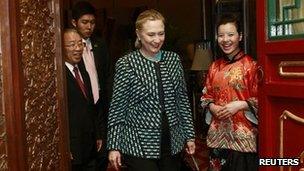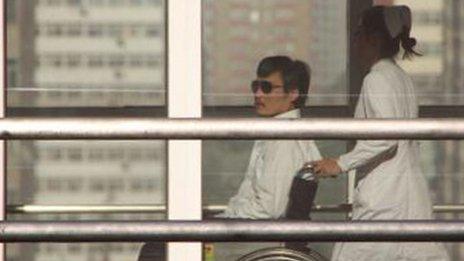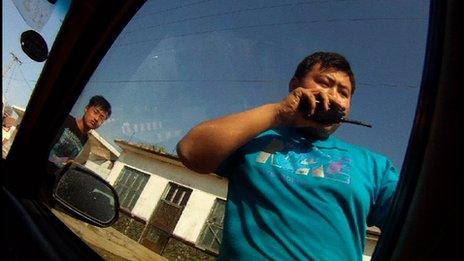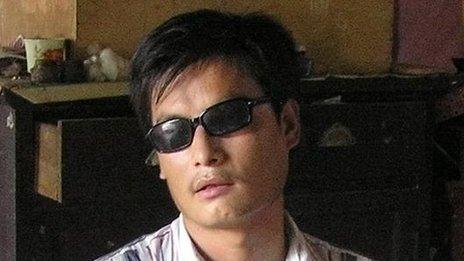Dissident Chen poses US-China test
- Published
- comments

Mr Chen's flight to the US embassy came right before Secretary Clinton arrived in Beijing
There is still a lot of uncertainty about the case of Chinese dissident Chen Guangcheng.
When he left the protection of the American embassy he reportedly told Secretary of State Hillary Clinton, "I want to kiss you", according to the state department.
Those close to Mr Chen say he simply expressed his wish to meet her.
If the confusion was just about a potential peck on the cheek, all would be plain sailing.
But Mr Chen is also saying that he only left the embassy because Chinese authorities had threatened to beat his wife to death.
Or he thought that is what lay behind their words. The US embassy says no such threat was made.
He also now appears to want to spend sometime abroad, which is striking given his earlier determination to stay in China.
But clear the clutter away and it is obvious that this is an important moment between China and the US.
The Chinese government has promised that Mr Chen will be allowed to stay in the country with his family and be allowed to study.
Twitter is alive with suggestions that US has been tricked. So Mrs Clinton may not feel like kissing Mr Chen, even if he wanted to.
He's put the Obama administration in a tricky position.
They have embraced the role of guarantors with apparent enthusiasm, ensuring that China keeps its promises and Mr Chen is treated well.
"Making these commitments a reality is the next crucial task," Mrs Clinton said earlier. "The United States government and the American people are committed to remaining engaged with Mr Chen and his family in the days, weeks, and years ahead."
At the moment it is not even certain they can "remain engaged" over the next few hours.
What can the US do?
Senior state department officials travelling with Mrs Clinton talk very fondly of Mr Chen and have gone out their way, external to stress the importance of what has happened.
They say Mr Chen wanted to stay in China because "he wanted to participate with what he thinks is ongoing in China, which is a very exciting, dynamic period that he believes that he has an important role to play, as do we".
You can hardly get more explicit that that. It is also quite an about-turn for President Obama's administration, accused of putting good relations with China ahead of human rights, external.
Chen Guangcheng is a blind, self-taught lawyer from a peasant family, whose campaign against forced abortion has become something of a cause celebre in the US. One newspaper labelled him "the Chinese Gandhi", external.
Yukon Huang
The obvious question is what happens if in a few months time the Chinese authorities decide to duff him up and send him to prison?
What will the US do? What could the US do? The intractable nature of the problem makes me think there is more going on than is immediately apparent.
His dramatic release from the US compound comes on the eve of important talks between the US and China. It's the fourth year of the strategic and economic dialogue.
I cannot recall any equivalent of these meetings, led by the two most senior figures in Mr Obama's administration. They are a top-to-bottom discussion of the many issues that matter to the world's two biggest powers. Last year's meeting covered everything from counter-terrorism to illegal logging.
In the past some in the Obama administration have been willing sweep human rights under the carpet when they get in the way of dealing with "big picture" issues like North Korea, Iran or the world financial system.
But now there is a growing view that the really big picture, critical for the whole world, is the evolution of the Chinese political system and that human rights are a crucial litmus test.
The leadership changes in China this year are at least as important as the US presidential election, but far more difficult to interpret. There is little doubt there's a considerable amount of turmoil.
Some think Mr Chen has become caught up in a power struggle between those in the Chinese Government who want to increasingly operate within the rule of law, external and those who believe crushing dissent is all important, external.
The US has a huge vested interest in the outcome of the struggle, but one might think it would want to keep at a safe distance. But in the case of Mr Chen they have been forced to take sides and make promises that are very hard to keep, unless some Chinese officials are on board.
If the Chinese government is more monolithic than I have suggested, then the US is on a very high-risk path indeed.
There are already signs the deal may be unravelling. This could be a defining moment for Sino-American relations.
- Published2 May 2012

- Published19 May 2012

- Published27 April 2012
